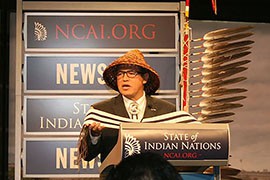Cronkite News has moved to a new home at cronkitenews.azpbs.org. Use this site to search archives from 2011 to May 2015. You can search the new site for current stories.
Tribal leader calls on feds to honor ‘duty’ to help Native nations
WASHINGTON – The president of the National Congress of American Indians said Thursday that the federal government has a “duty to honor” its agreements with tribal nations as they strive to improve across a broad range of areas.
Brian Cladoosby said in the 13th annual State of Indian Nations address that Indian Country is doing better than it ever has been, but that there is still a need for improvements and for updating of tribal-federal relations.
Tribal nations accepted less land in exchange for three basic promises from the federal government, Cladoosby said: The right to govern themselves, the right of tribal governments to deliver essential services and the right to manage their lands and resources in their best interests.
“This trust: It’s not a handout, it’s a contract. It’s a commitment. And it’s their duty to honor it,” he said of the federal government.
The speech, delivered every year after State of the Union address, touched on everything from technology to taxes to the name of the Washington Redskins. The wide-ranging, 45-minute speech called for improvement in areas like government-to-government policies as well as the way Native peoples are seen by others.
Cladoosby cited the Washington football team’s name as one area where the perception of Native Americans is still negative, even though opponents of the name have won recent court victories and some senators have threatened to revoke the NFL’s tax-exempt status if it continues to back the name.
Cladoosby said the offensive nature of the term has changed little since an 1863 Minnesota newspaper that said the “state reward for dead Indians has been increased to $200 for every red-skin sent to Purgatory.”
“History is clear on what that vile word meant: It was the scalped head of an American Indian man, woman or child that trappers and hunters sold, like a beaver pelt, for money,” Cladoosby said.
“This isn’t a partisan issue, this isn’t an issue of political correctness,” he said. “We’re not trying to make news or noise. We’re trying to make progress.”
Cladoosby outlined a lengthy list of other areas where tribes are trying to make progress, touching often on federal and tribal relations.
“I see three ways we can modernize the trust relationship: simplifying and streamlining government regulation, improving education, and focusing the talents of tribal nations to create economic growth,” he said.
He pointed to tax policies that he said penalize Native Americans. Those range from difficulties issuing tax-exempt bonds for some construction projects on tribal lands to a tax credit for caregivers of adopted special-needs children – which residents of reservations cannot claim.
Cladoosby highlighted technology as another area where tribal nations are in desperate need of modernization. He said the best figures he has show that only 10 percent of Indian Country has access to broadband – but noted that even the data on the digital divide in tribal communities is as outdated as the technology within them.
Cladoosby praised President Barack Obama for his visit this past year to a Sioux reservation and personally invited House Speaker John Boehner and other members of Congress to visit Indian Country as well.
And Cladoosby reminded policymakers to remember to value tribal leaders as partners and to seek their input on important policy and legislation, such as the Keystone pipeline and issues like renewable energy, healthcare, education, privacy rights and immigration.
“Our rights as sovereign nations were not granted by the Constitution,” Cladoosby said. “They existed before there was a Constitution.”







